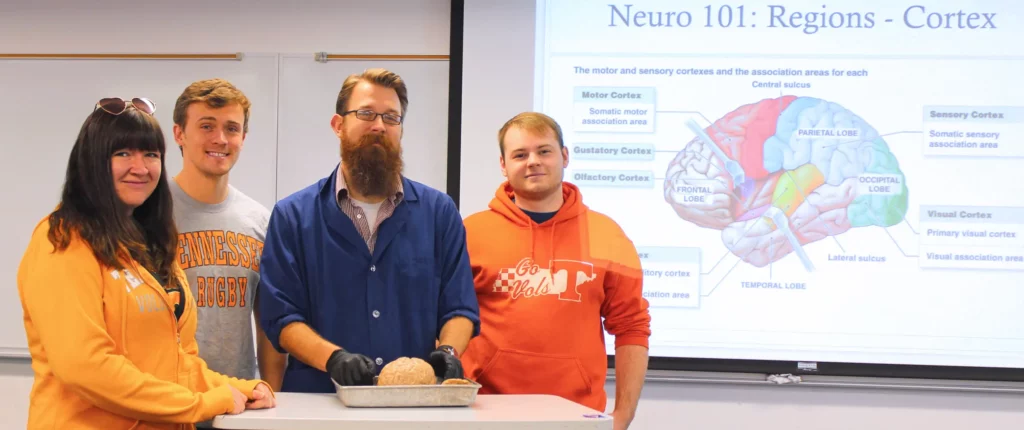New Name Reflects Neuroscience Growth at UT

With an expansion of its name, the Department of Psychology and Neuroscience at the University of Tennessee, Knoxville, is showcasing wide opportunities for studying systems that control behavior in humans and other animals.
The neuroscience major and minor began as a College of Arts and Sciences (CAS) interdisciplinary program in 2013 and became part of the Department of Psychology in fall 2019. Now a third of the department’s majors are earning a BS in neuroscience.
“We requested the change so that the department name reflects both of our majors, as well as faculty research expertise,” said Interim Divisional Dean for Social Sciences Gina Owens.
Over five years the number of neuroscience majors more than doubled, with 635 majors and 95 minors by fall 2024. UT’s Experimental Psychology master’s and PhD programs also offer a specialization in neuroscience and behavior.
Faculty teaching undergraduate courses are conducting research on cellular, cognitive, and behavioral neuroscience topics. For example, they are examining neurobiological mechanisms that regulate sleep, stress, social behavior, and decision-making.
“This is an incredibly exciting moment for one of our college’s strongest academic units,” said Professor Patrick Grzanka, former divisional dean for social sciences. “For generations, the Department of Psychology has been a field leader in clinical, counseling, and experimental psychology. Now, the department’s renaming clearly establishes neuroscience as key to the unit’s strength in this critically important area of research and training.”
“I’m especially proud of the interdisciplinary collaboration across the college that has resulted in neuroscience’s tremendous growth and success,” he said.
Interdisciplinary Study
Neuroscience remains deeply interdisciplinary, with courses in the Department of Biochemistry and Cellular and Molecular Biology (BCMB) and the Department of Ecology and Evolutionary Biology (EEB), as well as math, physics, chemistry, and more.
“New tenure-track and teaching faculty in psychology, BCMB, and EEB have enriched the major by creating new classes and expanded the research opportunities available to students,” said Professor Matt Cooper, who chairs the neuroscience steering committee and will become director of the major in fall 2025.
“We are excited to expand our teaching and research in computational neuroscience in the future,” Cooper said. “Several neuroscience faculty use computational approaches in their research, and we are excited about opportunities to add computational courses to the major.”
Faculty are using machine learning models to analyze research data such as animal behavior, microscopic images, and human electroencephalograms, which measure brain activity.
The department also added a new tenure-line faculty member through a faculty hiring initiative aimed at making UT a leader in developing cognitive neuroscience-inspired AI solutions.
Undergraduate Research Experiences
“Lab experience is an important component of the major, and undergraduate research opportunities have expanded as the neuroscience community on campus has grown,” noted Cooper. He is also director of the Neuroscience Network of East Tennessee (NeuroNET), a partnership of UT, the UT Medical Center, and Oak Ridge National Laboratory that provides additional experiences for undergraduates, including lab placements.
“The benefit of being a neuroscience major at a major research university is that there are many opportunities to get involved in undergraduate research,” he said. Beyond lab courses and working in faculty labs, students can gain research experience with community partners.
Students interested in neuroscience can explore the topic beyond the classroom and lab as well. The Advancement of Neuroscience Club offers both professional development and avenues to engage in community activities. Plus, UT’s Neuroscience in the UK study abroad program takes Volunteers to London for a month-long exploration into the integration of multisensory perception and the neurobiological basis of stress.
By Amy Beth Miller